IPSI Newsletter

TOPIPSI NewsletterIPSI Newsletter, December 2020
IPSI Newsletter, December 2020
2020.12.23
Dear IPSI members and friends,
Greetings from the IPSI Secretariat in Tokyo, Japan. As we approach the end of this year full of challenges, we hope all of you are staying healthy and safe whatever your current situation. As always, IPSI and its members continue to stay active in a wide variety of projects and activities related to landscape and seascape approaches towards “societies in harmony with nature”, even during the COVID-19 pandemic.
This month’s newsletter contains season’s greetings from the IPSI Secretariat and Steering Committee, which recently held its fifteenth meeting where it welcomed four new members to the partnership. We also have reports from a recent event held in Chinese Taipei and a number of new knowledge projects: a publication on SEPLS and COVID-19 developed from a session at ISAP2020; a new book on implementation of the Satoyama Initiative from the Food and Fertilizer Technology Center for the Asian and Pacific Region (FFTC); and a video made by the IPSI Secretariat’s Himangana Gupta on infrastructure impacts in India. We are also pleased to share a recent case study from Environmental Protection & Conservation Organisation (EPCO) in Mauritius.
As always, please feel free to contact us to submit any new case studies or other information about your activities, or if you have any questions or comments.
IPSI Secretariat
Season's Greetings from the IPSI Secretariat (and Steering Committee)
We at the IPSI Secretariat would like to sincerely thank you for your ongoing support and cooperation. 2020 has been a difficult year for many, particularly due to the global COVID-19 pandemic, but also with many other ongoing challenges facing the world. Still, the important work of all IPSI members with SEPLS continues, despite the cancelation and delay of many important biodiversity-related events and activities. Our membership has now grown to 271 organizations in all regions of the world, and members continue their activities online and on the ground as much as possible. 2021 will be an even more important year for biodiversity and we look forward to working with all of you. We wish you the best of health and success in your own lives and all of your work toward “societies in harmony with nature”.
(Photo from the recent Fifteenth Meeting of the IPSI Steering Committee (SC-15))
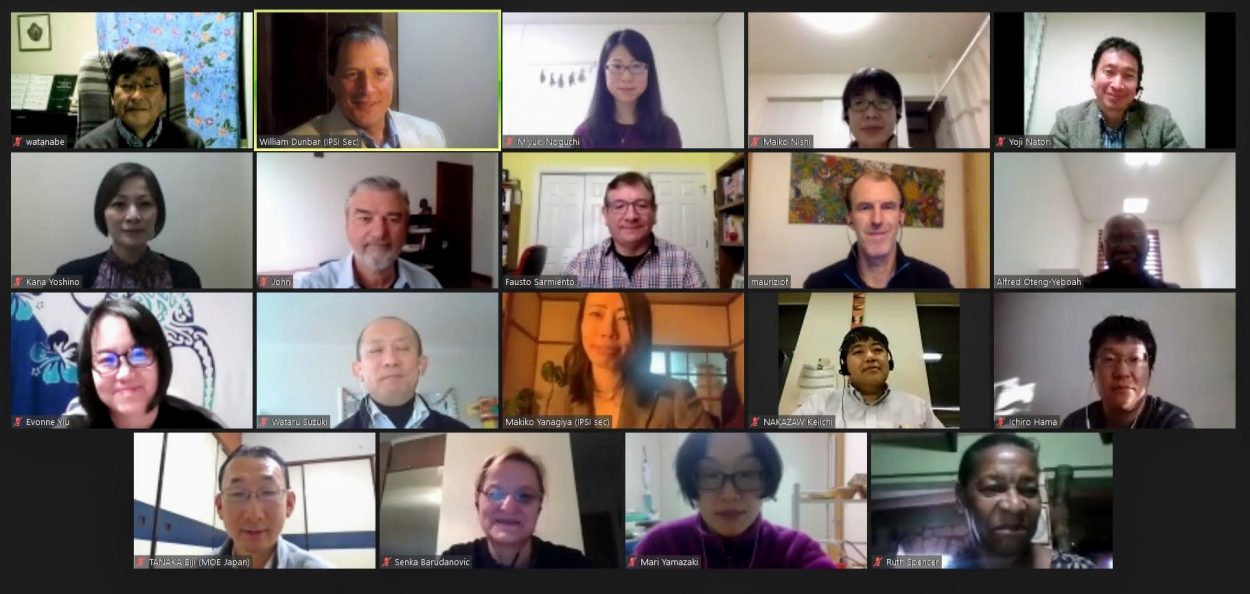
IPSI welcomes 4 new members
We are pleased to announce that at its fifteenth meeting (SC-15) held online in December 2020, the IPSI Steering Committee confirmed four new member organizations, bringing IPSI’s total membership to 271 organizations. It is therefore our pleasure to welcome:
-
Daluhay (Non-governmental or civil society organization, Philippines)
- Fisheries Research Institute, Council of Agriculture, Executive Yuan (Governmental organization, Chinese Taipei)
-
Farmers’ Seed Network (Non-governmental or civil society organization, China)
-
Nagenahiru Foundation (Non-governmental or civil society organization, Sri Lanka)
We look forward to collaborating closely with all of them in promoting the concept of the Satoyama Initiative in the future.
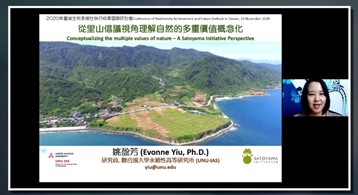
Recent event: "2020 Conference on Biodiversity in Taiwan: Achievements and Future Outlook"
An event titled “2020 Conference on Biodiversity in Taiwan: Achievements and Future Outlook” was held in Taipei (Chinese Taipei) 27 to 28 November 2020, organized by the National Taiwan University and IPSI member the Forestry Bureau, Council of Agriculture, Executive Yuan. The Conference was attended by many IPSI members in Chinese Taipei, who spoke about their experiences achieving the Aichi Biodiversity Targets and discussed the challenges ahead for the next decade of biodiversity conservation. From the IPSI Secretariat, UNU-IAS Researcher Evonne Yiu gave a presentation on “Conceptualizing the multiple values of nature – A Satoyama Initiative Perspective”, introducing different ways of conceptualizing multiple values of nature including the ongoing IPBES “Methodological assessment regarding the diverse conceptualization of multiple values of nature and its contributions, including biodiversity and ecosystem functions and services”. She also explained how multiple values of nature can be applied through IPSI activities by illustrating the findings of the Satoyama Initiative Thematic Review Volume 5 “Understanding the multiple values associated with sustainable use in socio-ecological production landscapes and seascapes (SEPLS).”
A report of the Conference (in Chinese) can be found on the Forestry Bureau website here, and a video recording of the Conference are available at the Conference Facebook page here.
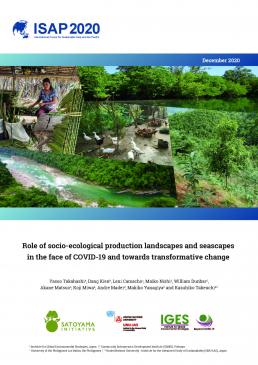
New publication: "Role of socio-ecological production landscapes and seascapes in the face of COVID-19 and towards transformative change"
A new publication titled “Role of socio-ecological production landscapes and seascapes in the face of COVID-19 and towards transformative change” was recently developed by IPSI members the Institute for Global Environmental Strategies (IGES) and UNU-IAS, host of the IPSI Secretariat. The publication is an outcome of a session co-organized by IGES and UNU-IAS during the 12th International Forum for Sustainable Asia and the Pacific (ISAP2020) held in November 2020. It contains contributions from speakers in the session, all from IPSI member organizations, on issues related to SEPLS in light of the COVID-19 pandemic and recovery. Readers are highly recommended to read this publication, which contains a wealth of information on how we can recover better from the pandemic by nurturing SEPLS.
The publication is available for download on the IGES website here.
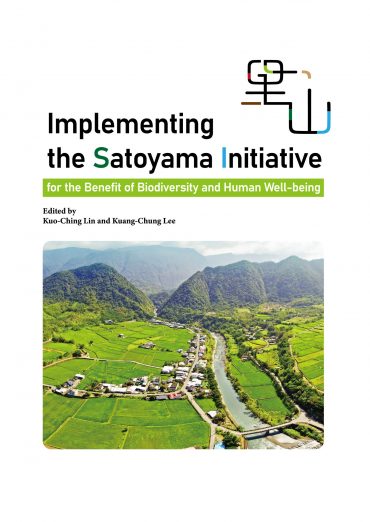
New book: "Implementing the Satoyama Initiative for the Benefit of Biodiversity and Human Well-Being"
IPSI member the Food and Fertilizer Technology Center for the Asian and Pacific Region (FFTC), located in Chinese Taipei, recently published a book titled “Implementing the Satoyama Initiative for the Benefit of Biodiversity and Human Well-Being”, edited by former FFTC Director Dr. Kuo-Ching Lin and Dr. Kuang-Chung Lee from IPSI member National Dong Hwa University, along with an editorial team also including the IPSI Secretariat’s Researcher Evonne Yiu. The book includes chapters from a wide array of authors on biodiversity, agriculture, area-based conservation, and other topics with a Satoyama Initiative perspective, including several from IPSI members. This should be another great resource for the IPSI community, and readers are strongly recommended to take a look.
The book is available for download from the FFTC website here.
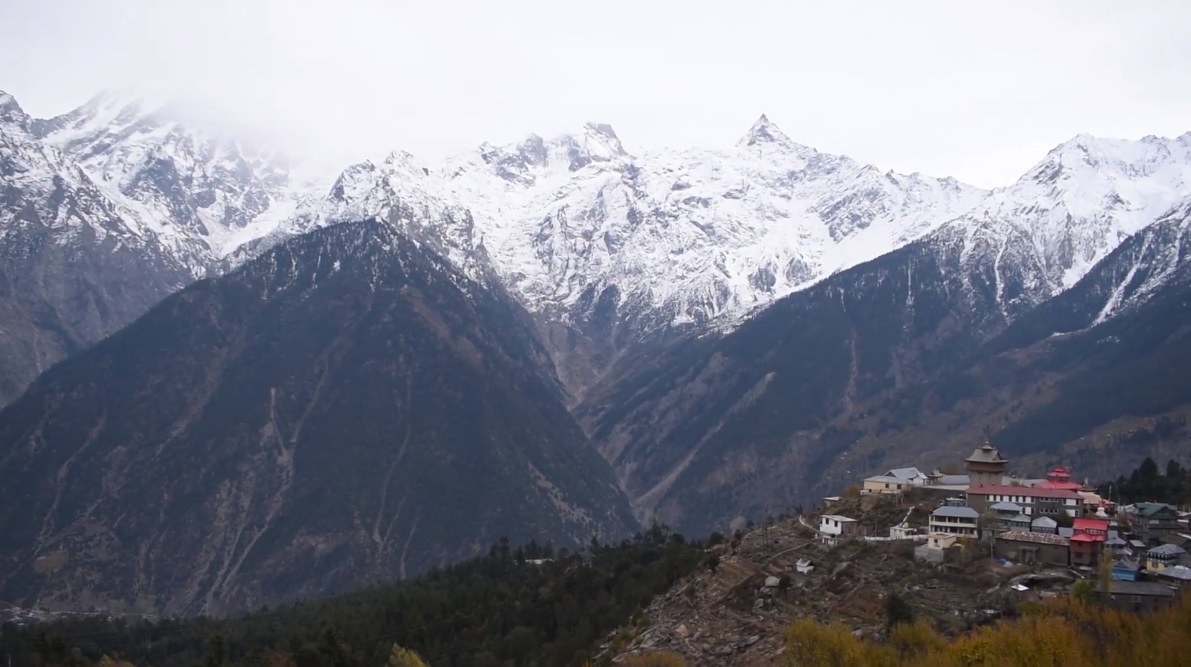
New video: Hydropower, livelihoods, climate and biodiversity nexus in the Indian Himalayan region of Kinnaur
A new video was recently developed by Dr. Himangana Gupta, JSPS-UNU Research Fellow at the IPSI Secretariat at UNU-IAS, demonstrating threats to a landscape in Kinnaur, India from hydropower projects. According to the video, in the region “tribal communities manage both apple orchards and forests. It is a unique socio-ecological production landscape, with high dependence on biodiversity. However, the non-inclusion of proximate stakeholder concerns and priorities while making important developmental decisions has disrupted the ecological functioning of the region and the multiple functions derived from this landscape. On the one hand, this documentary shows how biodiversity and nature’s direct benefits to the people have been compromised for short-term benefits. On the other hand, it shows the perspectives on climate change and impacts of rising extreme events, which are predicted to become more intense as a result of unbridled and irrational construction activities to change the face of the river valley.”
The video can be viewed on YouTube here.
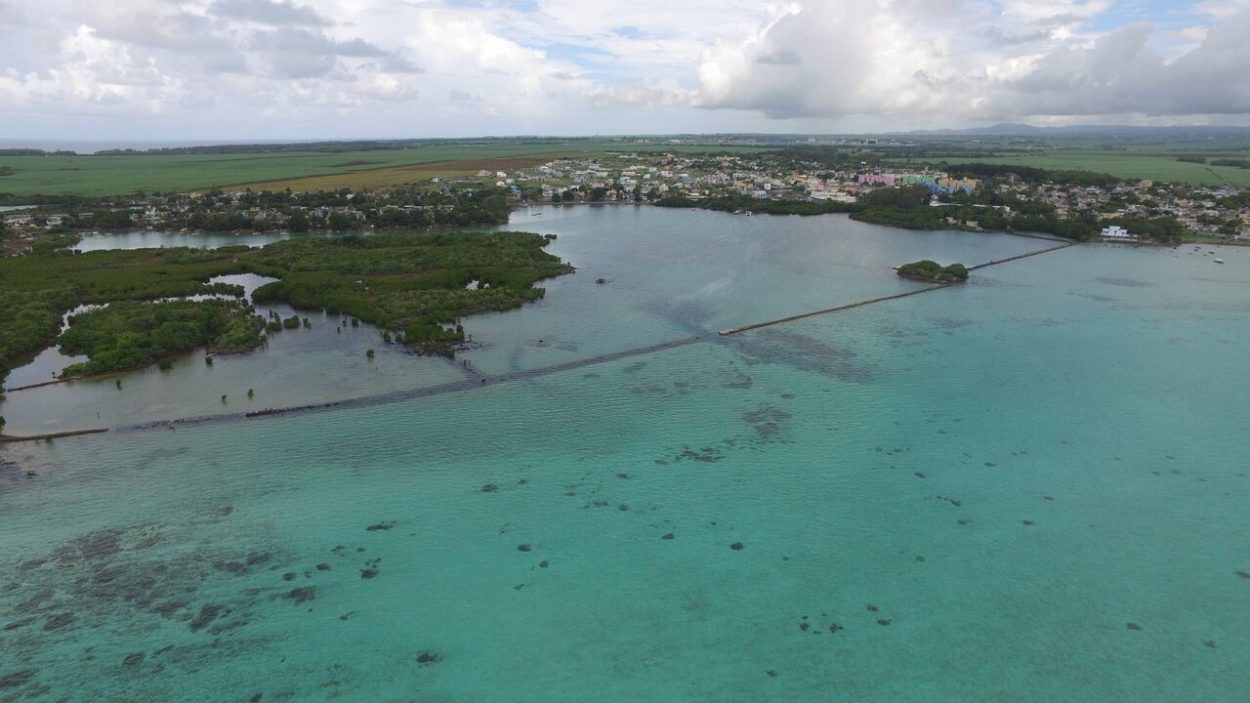
Recent Case Study: Environmental Protection & Conservation Organisation (EPCO)
The IPSI Secretariat is proud this month to share one of our recent case studies from Environmental Protection & Conservation Organisation (EPCO) in Mauritius. The case study is titled “Recognising the local values of coastal wetland biodiversity for sustainable economic and livelihood development at Résidences La Chaux ‘Barachois’, Mauritius”, and was also included as a chapter in the Satoyama Initiative Thematic Review vol. 5.
According to the case study, Barachois are Mauritian historical seascape, which is composed of brackish water lagoons enclosed by stone walls traditionally used for fish raring under French rule before 1800, as well as patches of mangroves and coastal woodlands surrounding the lagoons. They, however, are now mostly abandoned and turned into waste dumping ground. The Environmental Protection & Conservation Organisation (EPCO) initiated a community-based project to pilot the restoration the barachois seascape that enhances its socio-economic, cultural, aesthetic and environmental values and thus to improve local people’s livelihoods and promote biodiversity conservation. As a part of the project appraisal and implementation process, the project investigated multiple values that stakeholders in the target community associate with the barachois seascape by household surveys and focus-group discussions. The recognition of the values that barachois seascape entails for the local community enabled the project to draw stronger commitment of a wide range of stakeholders to the restoration of barachois and sustainable resource management in it, resulting in the establishment of a local cooperative. This process has improved local decision-making capacity and will contribute to the harmonization of legislation in the future.
For the full case study, please see the IPSI website here.
Contact
Please be sure to let the Secretariat know if there are any changes in your e-mail address or contact information.
Secretariat of the International Partnership for the Satoyama Initiative
United Nations University Institute for the Advanced Study of Sustainability (UNU-IAS)
5–53–70 Jingumae
Shibuya-ku, Tokyo 150-8925
Japan
Tel: +81 3-5467-1212
Fax: +81 3-3499-2828
Email: isi@unu.edu
If you have been forwarded this newsletter and would like to SUBSCRIBE, you can do so on the IPSI website here.


